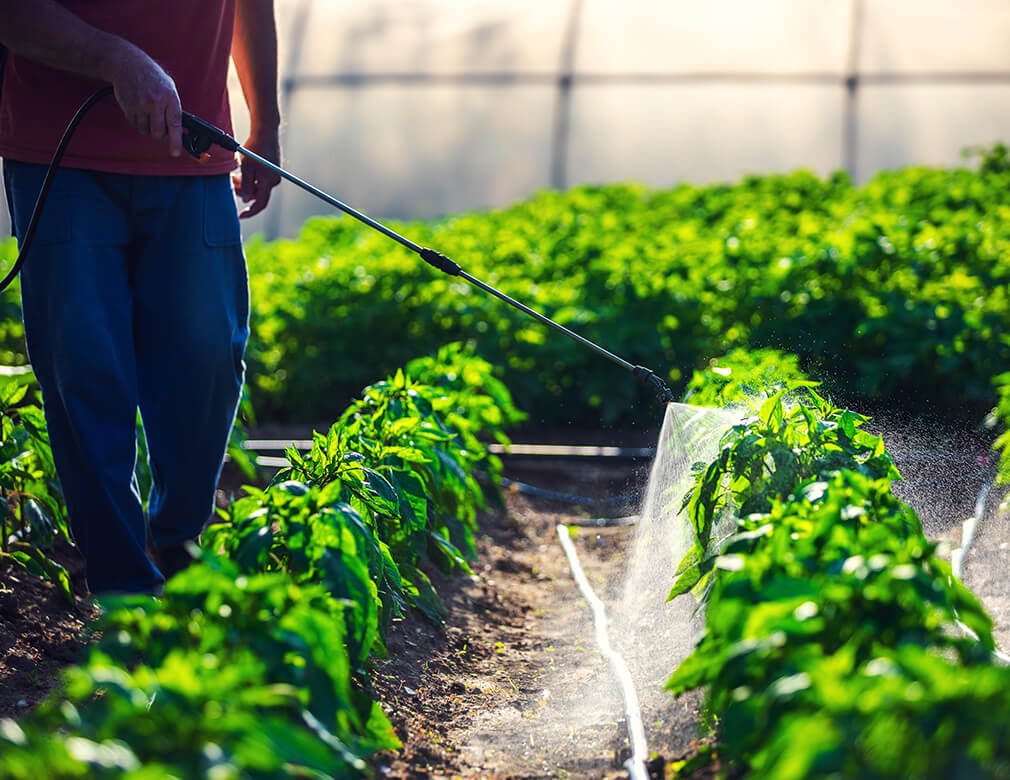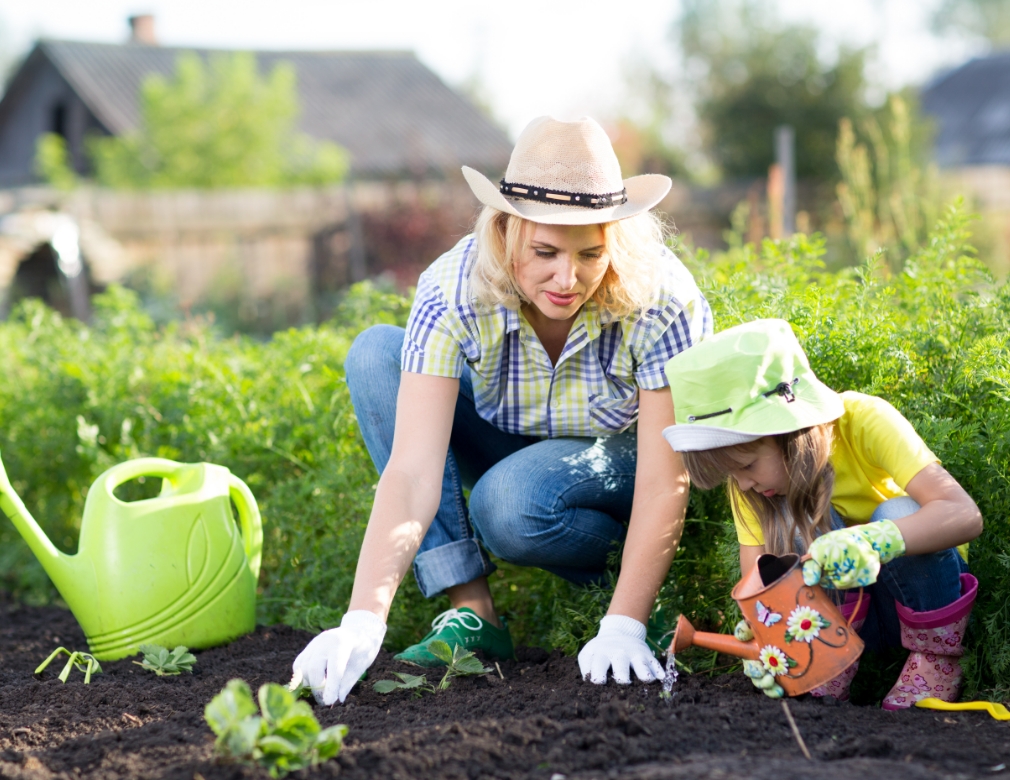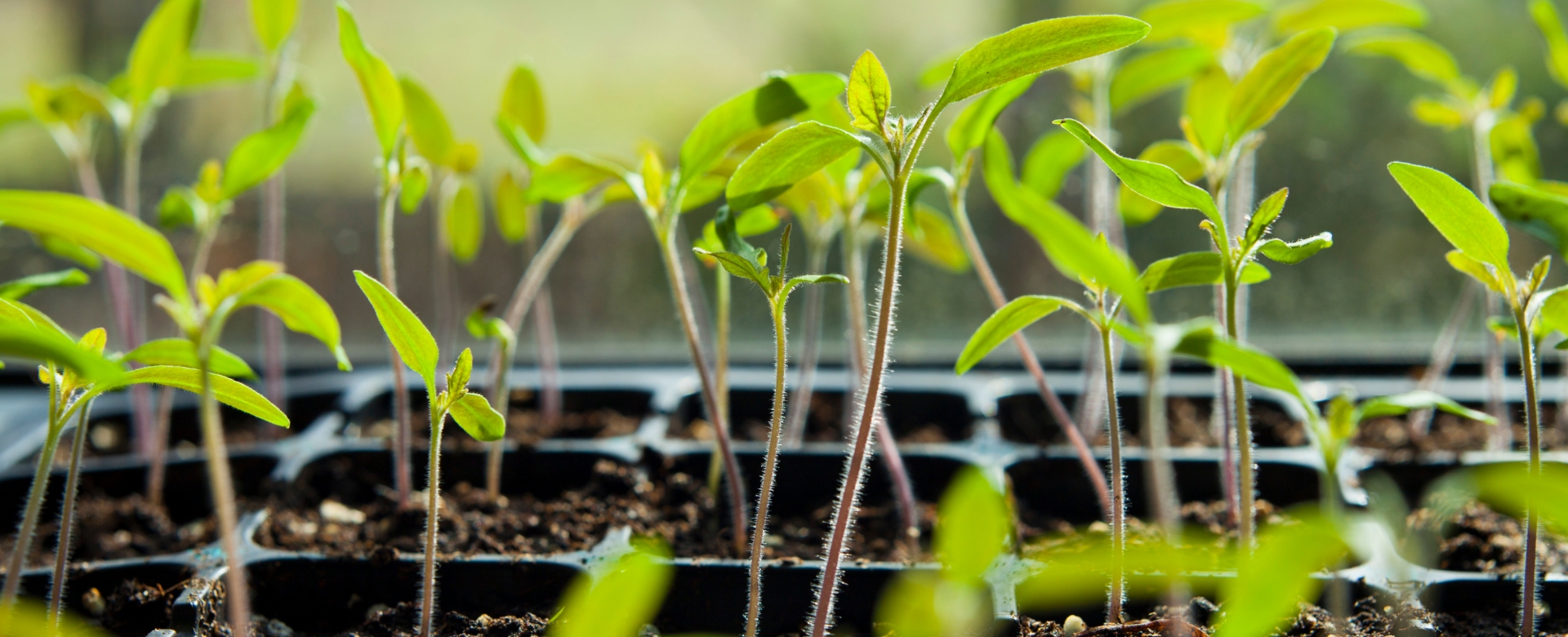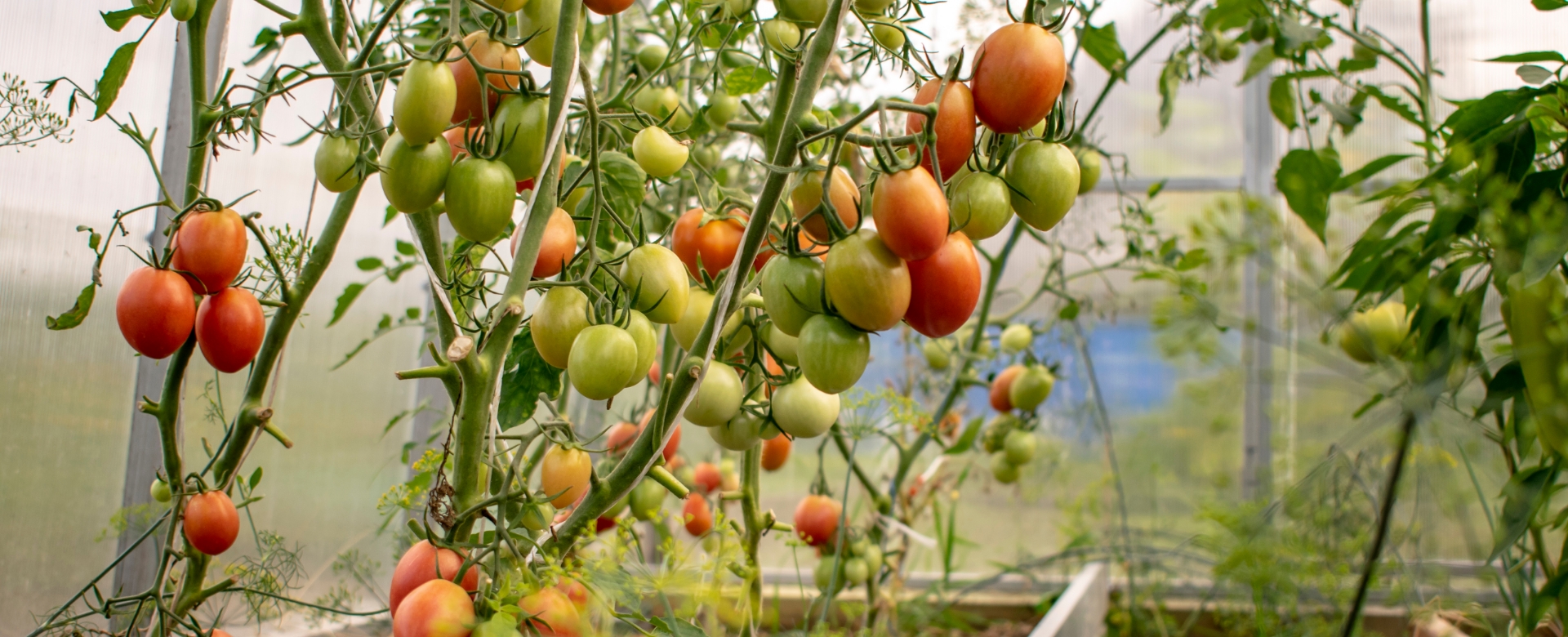Cabbage worms are destroying your brassicas. What do you do?
Harsh chemicals might get the job done. But there’s a better solution: Organic pesticides.
Organic pesticides are natural sourced, minimally processed substances. They’re used to deter common garden pests like cabbage worms. In many cases, organic pesticides are just as effective as traditional chemicals.
However, organic pest control is better for the environment, doesn’t harm animals, and won’t contaminate the foods you grow.
Which one is best for common pest problems? This guide provides everything you need to know about organic pesticides, including how they work, what they are, and a list of the best organic pesticides to use.
What Are Organic Pesticides?
Organic pesticides are pest control agents derived from natural sources like plants, minerals, or microbes. They are minimally processed and comply with organic certification standards.
Generally, they’re considered less toxic than synthetic pesticides. However, they’re still used to kill or repel pests. Ultimately, there are two main types: Homemade pesticides and commercially produced options.
The DIY Pesticide Route
Homemade pest remedies are perfect for resourceful gardeners. Options include vinegar sprays, chili pepper solutions, and soapy rinses. They work by using the natural pest-repellent properties of household ingredients like garlic, onions, and citrus peels.
Pros:
- They’re cheap to make ad readily available.
- You can tailor them to specific pest problems.
- Generally considered less toxic than synthetic pesticides.
Cons:
- May not provide long-lasting control for serious infestations.
- DIY mixtures often degrade quickly and need frequent reapplication.
- Finding the right recipe and concentration takes time.
Commercial Organic Pesticides
Store-bought organic pest products are typically formulated with natural ingredients. Common ingredients include neem oil or pyrethrum (derived from chrysanthemum flowers).
Commerical pest products tend to be tested and formulated for specific problems. However, they may have a heightened risk of toxicity (even if they’re organic).
Pros:
- Ready-to-use and requires minimal preparation.
- Have a longer shelf life.
- Products often address specific pest types or life stages.
Cons:
- Generally, more expensive than DIY options.
- Some organic pesticides, like pyrethrum, can be harmful to beneficial insects and pollinators.
- Finding the right product for your specific problem requires research.
Which Organic Pesticide Is Right for Your Garden?
Really, the best option comes down to your budget and the problem you face. A serious infestation, for example, may require a more potent pesticide, while DIY options might be something you apply regularly as a task when tending to your garden.
Before you choose, consider these tips:
- Know Your Pest. Before using any pesticide, organic or not, identify the pest you’re dealing with. Knowing the enemy helps you choose the most effective weapon.
- Prevention. Prioritize integrated pest management practices in your garden. Strategies like sanitation, crop rotation, and attracting beneficial insects will reduce pest risk.
- Montior. Catch pest problems early before they can do substantial damage. Common warning signs include holes in leaves, droppings and castings on leaves, eggs and larvae on leaves.
Benefits of Organic Pesticides
As a gardener, you want safe, healthy foods. And that’s hard to achieve with synthetic pesticides. Just as you wouldn’t use pressure-treated lumber in your raised beds, you don’t want to use chemical fertilizers.
Synthetics can do long-term damage. Sure, they might repel pests, but they can also harm helpful insects, damage soil microorganisms, or leach into the food you grow.
Organic pest products, as an alternative, offer a range of benefits for your garden, health, and the environment. Some key advantages include:
- Safer for ecosystems: Organic pesticides break down quickly and have a lower risk of contaminating soil, water, and air. It’s a great solution for wildlife gardens, for example.
- Promotes soil health: Organic products encourage the growth of beneficial microbes and fungi in the soil. This can support soil fertility and structure.
- Safer for humans and pets: Organic pesticides greatly reduce the risk of toxicity for humans and pets.
- Healthier food: Organic methods minimize pesticide residues on fruits and vegetables.
- Reduces potential for pesticide resistance: Overuse of synthetic pesticides can lead to pest resistance. Using gentler approaches and diversifying the types you use can help.
Best Organic Pesticides for Garden Pests
Here’s a brief overview of some of the best organic pesticides, including what it is, what pests it works on, how it’s made, and potential cons:
1. Insecticidal Soap Spray
You can buy this soap spray from a store, or you can prepare it yourself at home. Soap sprays are an easy DIY option, and they’re effective against a variety of soft-bodied insects. To make it: Mix a tablespoon of dish soap with one gallon of water. You can add a few tablespoons of oil for better coverage.
- What It Is: A mixture of water, dish soap, and sometimes oil that disrupts the cell membranes of insects, causing them to dehydrate and die.
- What Pests to Use On: Aphids, mites, mealybugs, whiteflies.
- Potential Cons: Can harm beneficial insects like ladybugs and lacewings.
2. Garlic Spray
This spray has anti-bacterial, anti-fungal, and anti-viral properties, proving to be a potent organic pesticide. To make this spray, peel and crush 7 garlic bulbs and mix them with 16 ounces of water. Place the garlic in the water overnight to create an effective infusion.
- What It Is: A spray made from garlic cloves soaked in water, which repels insects with its strong odor.
- What Pests to Use On: Aphids, Japanese beetles, whiteflies, and some fungal diseases.
- Potential Cons: The strong odor can be unpleasant for some people.
3. Diatomaceous Earth
Made from fossilized algae, DE can be used to create a barrier against insects and slugs. As a natural pesticide, DE smothers insects and draws moisture from them. Typically, you sprinkle it around your plants to create a powder barrier against insects.
- What It Is: A powder made from fossilized algae that dehydrates and kills insects by puncturing their exoskeletons.
- What Pests to Use On: Ants, cockroaches, bed bugs, slugs, and some beetles.
- Potential Cons: Can irritate the lungs and eyes if inhaled.
4. Bacillus Thuringiensis
Bacillus thuringiensis, or BT for short, is a soil bacterium that produces proteins toxic to insect larvae. These proteins disrupt the gut of the larvae, causing them to stop feeding and eventually die.
- What It Is: A bacterium that produces a protein that is toxic to caterpillars and some other insects.
- What Pests It Works On: Caterpillars, mosquitoes, and some beetles.
- Potential Cons: Can be harmful to some beneficial insects.
5. Neem Oil Spray
Neem Oil Spray, extracted from the neem tree, disrupts insect hormones and repels them with its unique garlic-like scent. This is a widely used commercial solution sold as spray or concentrate.
- What It Is: An oil pressed from the seeds of the neem tree that disrupts the hormones of insects and prevents them from feeding and reproducing.
- What Pests It Works On: Aphids, mites, mealybugs, whiteflies, and some fungal diseases.
- Potential Cons: Can have a strong odor.
6. Tomato Leaf Spray
Tomato leaf spray, a DIY pesticide made from chopped leaves soaked in water, repels pests with its pungent aroma. Simple, natural, and budget-friendly, this is one of the easiest garden pest control solutions you can make.
- What It Is: A spray made from tomato leaves that repels insects with its strong odor.
- What Pests It Works On: Aphids, whiteflies, and some fungal diseases.
- Potential Cons: May not be effective against all pests.
7. Horticultural Oil
Commercially formulated horticultural oil coats and suffocates insects and their eggs. As an organic pesticide, it offers broad protection against aphids, mites, scale insects, and even some fungal diseases.
- What It Is: A light oil that smothers insects and their eggs.
- What Pests It Works On: Aphids, mites, mealybugs, scale insects, and some fungal diseases.
- Potential Cons: Can damage plants if used improperly.
8. Traps and Barriers
If you’ve ever used a pie pan full of beer (a type of pitfall trap) to deter slugs, you’ve used this method. There are a variety of barriers and traps, some DIY and some that you can purchase. Two of the most common include pitfall traps and sticky traps.
- What They Are: Physical barriers such as fences, screens, and traps that prevent pests from entering your garden.
- What Pests They Work On: A variety of pests, depending on the type of trap or barrier.
- Potential Cons: Can be time-consuming to install and maintain.
9. Pyrethrins
Derived from chrysanthemums, these fast-acting insecticides zap insects with a nerve-disrupting punch. They shield your garden from a wide range of invaders, from aphids to ants and beyond.
- What It Is: Natural insecticides derived from the chrysanthemum flower that act as a neurotoxin to insects, causing paralysis and death.
- What Pests It Works On: A wide range of pests, including aphids, beetles, caterpillars, flies, mosquitoes, and thrips.
- Potential Cons: Can be harmful to beneficial insects like bees and ladybugs and break down quickly in sunlight.
10. Companion Planting
Strategically pairing certain crops can be an effective pest prevention method. For example, planting a fragrant herb like basil near your tomato plants could help deter tomato-loving aphids.
- What It Is: Planting certain crops together to deter pests or attract beneficial insects that will prey on them.
- What Pests It Works On: A variety of pests, depending on the companion plants used. For example, marigolds can deter aphids, while basil can repel mosquitoes.
- Potential Cons: May not be as effective as other pest control methods and requires careful planning.
11. Potassium Bicarbonate
Potassium bicarbonate is a fungicide that disrupts fungal cell function. When applied to fungal infections like powdery mildew, this organic pesticide disrupts the cell walls of the fungus causing them to burst and die.
- What It Is: A fungicide that disrupts the fungal cell membrane, causing it to burst and die.
- What Pests It Works On: Fungal diseases such as powdery mildew, black spot, and rust.
- Potential Cons: Not effective against all fungal diseases and may damage plants if used at high concentrations.
12. Vegetable Oil Spray
To make this homemade insecticide spray, combine vegetable oil and mild soap. Mix the oil with a tablespoon of soap and shake it thoroughly. When it is ready to use, take 2 spoons of the oil mixture and combine it with 1-quarter of the water.
- What It Is: A mixture of vegetable oil and water that smothers insects and their eggs.
- What Pests It Works On: Soft-bodied insects such as aphids, mealybugs, and whiteflies.
- Potential Cons: Can be messy to apply and may not be effective against all pests. Plus, the oil can attract dust, making the plant appear unsightly.
How to Use Organic and Homemade Pesticides
Using pesticides safely is all about balance. Too much – even an organic solution – can cause more harm than good.
Balance also means using integrated methods for pest control. Rotate your crops, test companion plantings, and vary the types or pesticides you use. This gentler approach can help you minimize harm to soil and the delicate ecology.
Follow these guidelines for using pesticides (both organic and DIY):
- Identify Pest: Know your enemy! Different pests require specific solutions.
- Prepare Pesticide: Choose and mix your DIY concoction or dilute concentrated solutions according to instructions.
- Use Proper Equipment: Spray bottles or pumps for even application.
- Apply During Right Time: Early morning or evening to avoid harming beneficial insects.
- Cover Plants: Focus on infested areas, minimize overspray on foliage.
- Repeat AS Needed: Monitor pest activity and reapply if necessary.
- Rotate Pesticides: Different ingredients target different pests, avoid overuse of any one type.
Wrapping Up
Nothing can be more frustrating in a beautifully prepared garden bed than a pest problem. Fortunately, there are many ways gardeners can stay prepared.
First, get good at recognizing pest issues. Often, issues with watering or a lack of sunlight get confused for pest damage and vice versa. But if you see insect droppings, eggs, and leaf damage, then, you have synthetic and organic pesticides you can use.
Whichever pesticide you use, organic or homemade, be sure you record results. Note the issue you were seeing, how much you applied, when you applied it, and your results.
And finally, try different pesticides and recipes. A bit more soap or garlic might be what it takes to defeat the aphids once and for all!
Get your organic gardening and hydroponic growing supplies at Homegrown Outlet. Visit a New York location today!
FAQs
There's no single "best" natural pesticide, as the effectiveness depends on the specific pest you're targeting and your garden ecosystem. However, some good options to consider include:
- Soap and water
- Diatomaceous earth
- Neem oil
- Bacillus thuringiensis
- Companion planting
An integrated pest management approach is best. First, identify the pest and apply the right solution. Other steps include encouraging natural predators, using physical barriers and row covers, and finally using organic pesticides.
Ultimately, prevention and garden maintenance are the best solutions. Regularly check your plants and adapt your strategies based on pest pressure.
Only use organic pesticides on edible plants intended for consumption. Avoid applying them near flowers frequented by beneficial pollinators like bees. Choose less toxic options near water sources or areas frequented by pets and children. Always prioritize targeted application to avoid harming beneficial insects and the environment.
Organic pesticides generally break down faster than synthetic ones, so repeat applications may be necessary. However, overuse can disrupt the garden's natural balance and harm beneficial insects. Aim for the minimum effective dose and only apply when pest pressure warrants it. Monitor your plants closely and intervene only when necessary.
While generally less toxic than synthetic pesticides for humans and the environment, some organic options can still be harmful if used incorrectly. Always follow label instructions, prioritize targeted application, and choose the least toxic option effective against the target pest. Remember, natural doesn't always mean completely harmless.




